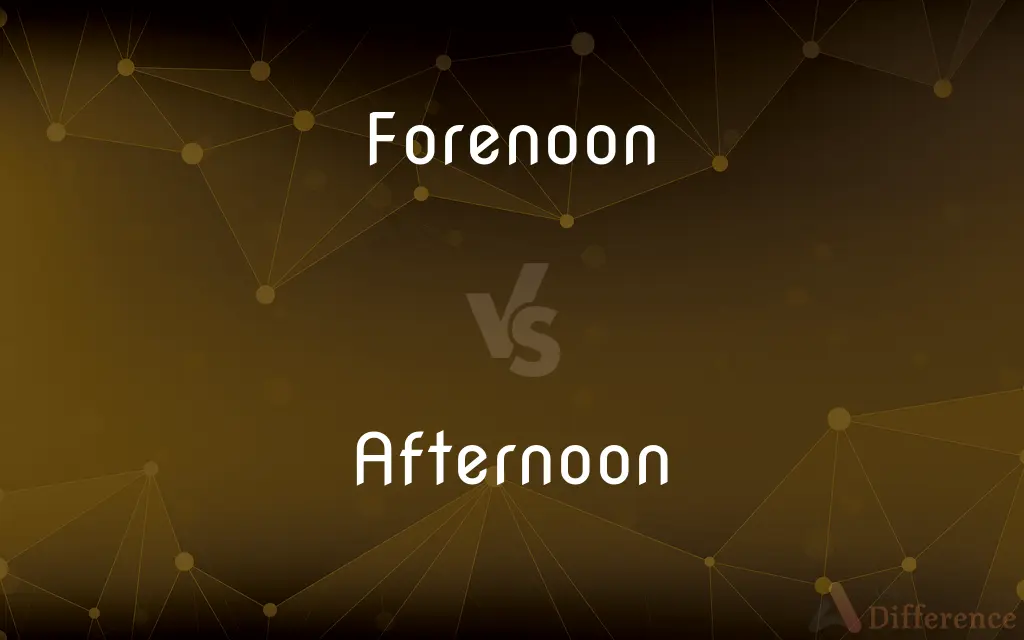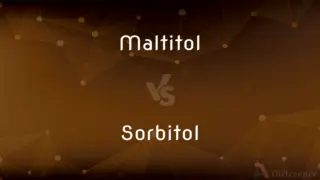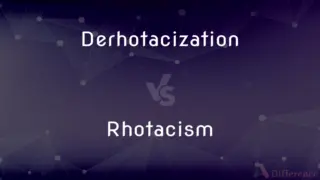Forenoon vs. Afternoon — What's the Difference?
By Tayyaba Rehman — Updated on August 18, 2023
Forenoon refers to the period of time between dawn and noon, while afternoon refers to the time between noon and evening.

Difference Between Forenoon and Afternoon
Table of Contents
ADVERTISEMENT
Key Differences
Forenoon and afternoon are both divisions of the day based on the position of the sun in the sky. Forenoon begins at dawn and extends up to noon. On the other hand, afternoon starts just after noon and lasts until evening.
Forenoon is a less commonly used term compared to afternoon. When people refer to the morning, they typically mean the time from dawn to noon, which encompasses the forenoon. However, the specific term "forenoon" zeroes in on the latter part of the morning, closer to noon.
Afternoon, conversely, is a term used more frequently. It's a time many associate with activities that take place post-lunch, such as work or leisure. While both forenoon and afternoon can be considered as productive hours of the day, societal norms and routines often ascribe different roles to each period.
Comparison Chart
Definition
The period between dawn and noon.
The time between noon and evening.
Common Usage
Less commonly used than afternoon.
More frequently used term.
ADVERTISEMENT
Time Frame
Latter part of the morning.
Post-lunch hours.
Relation to Noon
Precedes noon.
Follows noon.
Societal Connotations
Often associated with morning routines.
Linked to post-lunch activities.
Compare with Definitions
Forenoon
The latter part of the morning.
The mail usually arrives during the forenoon.
Afternoon
The time between noon and evening.
He scheduled a meeting for the afternoon.
Forenoon
The time between early morning and noon.
She usually finishes her chores in the forenoon.
Afternoon
The daylight hours after 12 pm.
The heat is most intense in the early afternoon.
Forenoon
The period preceding midday.
He often takes a walk in the forenoon.
Afternoon
The span of time between midday and the onset of evening.
The sunsets in the late afternoon are breathtaking.
Forenoon
The daylight hours before noon.
The market is busiest in the forenoon.
Afternoon
The post-lunch period.
She often feels drowsy in the afternoon.
Forenoon
The period of time between sunrise and noon; morning.
Afternoon
Afternoon is the time of the day between noon and evening. It is the time when the sun is descending from its peak in the sky to somewhat before its terminus at the horizon in the west.
Forenoon
The span of time after dawn but before 12 pm.
She enjoys reading in the peaceful hours of the forenoon.
Afternoon
The time from noon or lunchtime to evening
I'll be back at three in the afternoon
I telephoned this afternoon
She worked on Tuesday afternoons
Forenoon
The morning
The forenoon watch
The wind starts picking up in the forenoon
Afternoon
In the afternoon; every afternoon.
Forenoon
Syn of morning: the part of the day between sunrise and noon.
Afternoon
Short for good afternoon
Forenoon
The early part of the day, from morning to meridian, or noon.
Afternoon
The part of day from noon until dinnertime or sunset.
Forenoon
The time period between dawn and noon;
I spent the morning running errands
Afternoon
The latter part
In the afternoon of life.
Afternoon
The part of the day from noon or lunchtime until sunset, evening, or suppertime or 6pm.
Afternoon
(figuratively) The later part of anything, often with implications of decline.
Afternoon
(informal) A party or social event held in the afternoon.
Afternoon
In the afternoon.
Afternoon
Ellipsis of good afternoon
Afternoon
The part of the day which follows noon, between noon and evening.
Afternoon
The part of the day between noon and evening;
He spent a quiet afternoon in the park
Afternoon
A conventional expression of greeting or farewell
Afternoon
The part of the day following midday.
The park is most crowded in the afternoon.
Common Curiosities
How is forenoon different from morning?
While "morning" refers to the entire time span from dawn to noon, "forenoon" is more specific, pointing to the latter part of the morning.
Are there specific activities associated with the afternoon?
While it varies by culture and individual routine, the afternoon is often linked to work, school, or leisure activities that occur after lunch.
When does the afternoon begin?
Afternoon starts just after noon and extends until the evening.
What does forenoon mean?
Forenoon refers to the period of time between dawn and noon, often focusing on the latter part of the morning.
Why is the term afternoon more prevalent than forenoon?
Afternoon is a broader term, encompassing a longer period of the day, and it aligns with many societal routines like post-lunch activities or work hours, making it more commonly referenced.
Is forenoon commonly used in daily language?
While forenoon is understood, it is less commonly used compared to afternoon. People often use "morning" to cover the entire period from dawn to noon.
Can afternoon also mean early evening?
While afternoon primarily refers to the time post-noon and pre-evening, in casual conversation, people might use "afternoon" to indicate early evening hours.
Do other cultures have terms similar to forenoon and afternoon?
Yes, many cultures divide the day into segments based on the sun's position and have specific terms for these periods, though the concepts and exact timings might vary.
Is there a specific hour that defines the end of the forenoon?
Forenoon technically ends at noon, which is 12 pm.
Is noon the definitive separator between forenoon and afternoon?
Yes, noon acts as the dividing point between the forenoon and the afternoon.
Share Your Discovery

Previous Comparison
Maltitol vs. Sorbitol
Next Comparison
Derhotacization vs. RhotacismAuthor Spotlight
Written by
Tayyaba RehmanTayyaba Rehman is a distinguished writer, currently serving as a primary contributor to askdifference.com. As a researcher in semantics and etymology, Tayyaba's passion for the complexity of languages and their distinctions has found a perfect home on the platform. Tayyaba delves into the intricacies of language, distinguishing between commonly confused words and phrases, thereby providing clarity for readers worldwide.













































